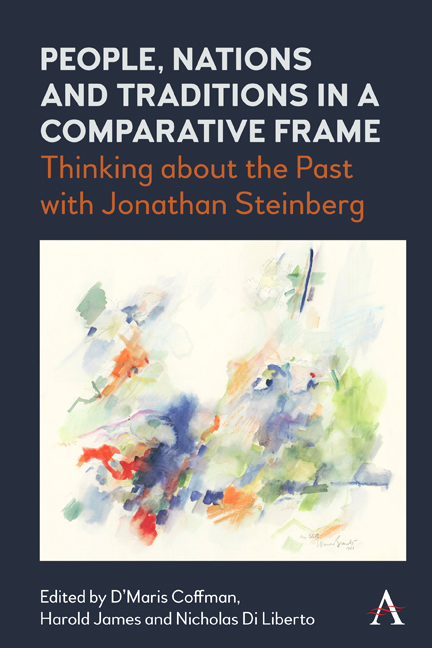 People, Nations and Traditions in a Comparative Frame
People, Nations and Traditions in a Comparative Frame Book contents
- Frontmatter
- Contents
- Foreword
- Acknowledgements
- Notes on Contributors
- Introduction
- Part One Methodological Pluralism and New Applications
- Part Two Personal and National Character
- Part Three Society, Families and the Sovereign Self
- Part Four History Out of Sync: Modernity and Tradition
- Part Five History, Narrative and the Human Condition
- Afterword
- Bibliography of Jonathan Steinberg’s Works
- Index
Chapter Sixteen - Being Human as a Method and Research Finding in Social Science
Published online by Cambridge University Press: 23 February 2022
- Frontmatter
- Contents
- Foreword
- Acknowledgements
- Notes on Contributors
- Introduction
- Part One Methodological Pluralism and New Applications
- Part Two Personal and National Character
- Part Three Society, Families and the Sovereign Self
- Part Four History Out of Sync: Modernity and Tradition
- Part Five History, Narrative and the Human Condition
- Afterword
- Bibliography of Jonathan Steinberg’s Works
- Index
Summary
One of the things that makes a human life go well is the recognition by the person who lives it that he is fully human, and the social forms in which that recognition is expressed.
To ‘recognize’ individuals or groups is to ascribe to them some positive status […] Failure to give someone due recognition is translated here as ‘disrespect’ […] [it includes] humiliation, degradation, insult, and disenfranchisement.
In spite of the huge differences between cultures, all that we know about human behaviour shows that it can be understood only by reference to people's own thoughts, dreams, hopes, fears and other feelings. This is not something invented by a particular culture. It is universal.
During one of our early encounters as friends and colleagues at Trinity Hall, Jonathan Steinberg introduced Alison Liebling to his dinner guest: a Hungarian. ‘Are you an historian?’ she asked. ‘I am a human being’, he replied. Of course he did. He was Jonathan's friend. We are all human beings in his company. We are all the more so because of his inquiries about our work and its relationship to our lives, and the power, incisiveness and warmth of his interest. He affirms our investigations. By finding answers to small questions, we might illuminate the larger questions: How can injustices happen? Why in this place? By exploring what ‘a few good men did in an evil time’, we understand more clearly. The act of understanding is of value.
Jonathan is, as he is for many others, Alison's intellectual soul mate or ‘alter ego’ in these respects. Their connection began in a conversation about interviewing research participants. His were survivors of the Holocaust. Hers were prisoners. These were largely different worlds and disciplines, but she knew in an instant that here was a man who grasped her work, who knew his territory like no one else. He got close to others in dialogue, and he understood personal complexity and struggle. None of this threatened scholarship but underpinned it. As Mary Midgley wrote:
Plays and novels exist because this inner strife continually insists on being reported. We know that our individual unity is not a state fully attained but an enterprise, an effort, an aspiration that is central to our lives, all the more central because we are so much troubled by the clashes.
- Type
- Chapter
- Information
- People, Nations and Traditions in a Comparative FrameThinking about the Past with Jonathan Steinberg, pp. 241 - 258Publisher: Anthem PressPrint publication year: 2021


